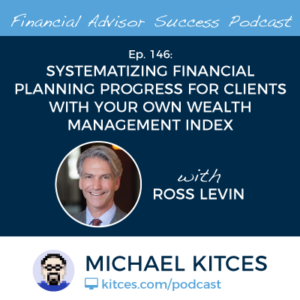In any business relationship, there is a desire of the seller to convince the buyer to purchase their product or service, which presents a fundamental conflict of interest for the seller’s objectivity about whether his/her products or services are really in the buyer’s best interest. But beyond the inevitability of some conflict of interest simply by virtue of the seller/buyer relationship itself (which can never be fully eliminated), there lies a wide spectrum of how manageable (or unmanageable) additional conflicts of interest may be, which is influenced not only by the actual product or service being offered, and how it is compensated, but also by the stories that are told to justify the value of what is being offered.
In our 19th episode of Kitces & Carl, Michael Kitces and financial advisor communication expert Carl Richards talk about these conflicts of interest, and the dilemma that financial advisors face when determining where to draw the line between a ‘manageable’ conflict of interest and one that is ‘unmanageable.’
Advisors whose livelihoods are based on the commissions they generate by selling financial products are often held up as a case-in-point example for such ‘unmanageable’ conflicts of interest. For instance, it may be difficult for an advisor to avoid recommending an annuity with a higher commission payout rate, or the company product that counts towards a year-end bonus. This is not to say there is anything wrong with salespeople, as they do play an important role in facilitating the purchase of products for those who want to purchase one; however, consumers themselves can help manage this conflict with a clear understanding of the customer-salesperson relationship in the first place. It is clearly recognized from the start that the salesperson has very little, if any, stake in the customer’s best interest, and is simply trying to make a sale, and the prospective customer can judge accordingly.
Yet the reality is that sales-based compensation isn’t the only fee structure where conflicts of interest exist. For example, an RIA and its advisor’s compensation is typically based on the amount of assets they have under management, which can present a significant conflict of interest when advising a client to use some of their assets to pay down their debt (or not). Perhaps such conflicts are more manageable for an advisor who “simply” manages investments (since the relationship is generally clear – the asset manager’s objective is clearly to manage the client’s money, and earn the fees being charged accordingly). However, for the financial advisor who offers “comprehensive” financial planning services, the nature of the conflict of interest becomes more problematic. Because now, along with the advice that’s being provided comes the implied understanding that such advice will be in the client’s best interest (by definition of being ‘advice’). Which in turn can complicate the story advisors need to be able to tell their clients, because the asset management fees earned may not seem to reconcile with the financial planning advice they’re being asked to provide. Yet fiduciary advisors need to be comfortable with explaining that apparent gap, in the interest of honest, full disclosure.
Ultimately, the key point is that conflicts of interest will exist regardless of the models or methods financial advisors decide to use. But not all conflicts of interest represent the same depth of conflict, with some more easily managed than others. Which means it’s most important to determine whether the conflict of interest is manageable and still reasonably aligned with the fiduciary responsibility of the advisor, or not. Particularly as both practice models and fiduciary standards evolve, the discussion of what it means to do the right thing as a fiduciary is an important conversation for the financial services industry as a whole to have.

 Welcome back to the 147th episode of Financial Advisor Success Podcast!
Welcome back to the 147th episode of Financial Advisor Success Podcast! Welcome back to the 146th episode of Financial Advisor Success Podcast!
Welcome back to the 146th episode of Financial Advisor Success Podcast!
